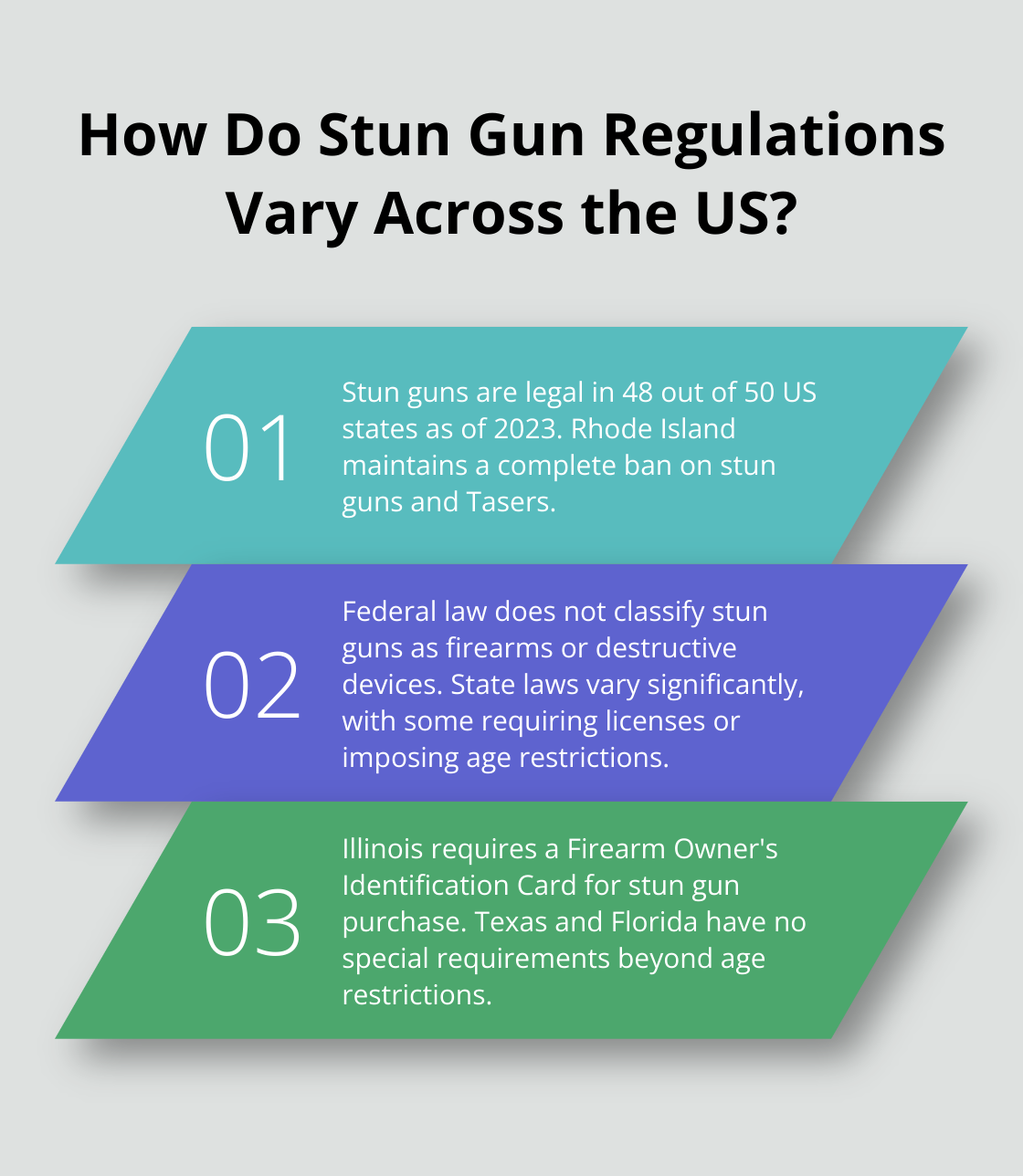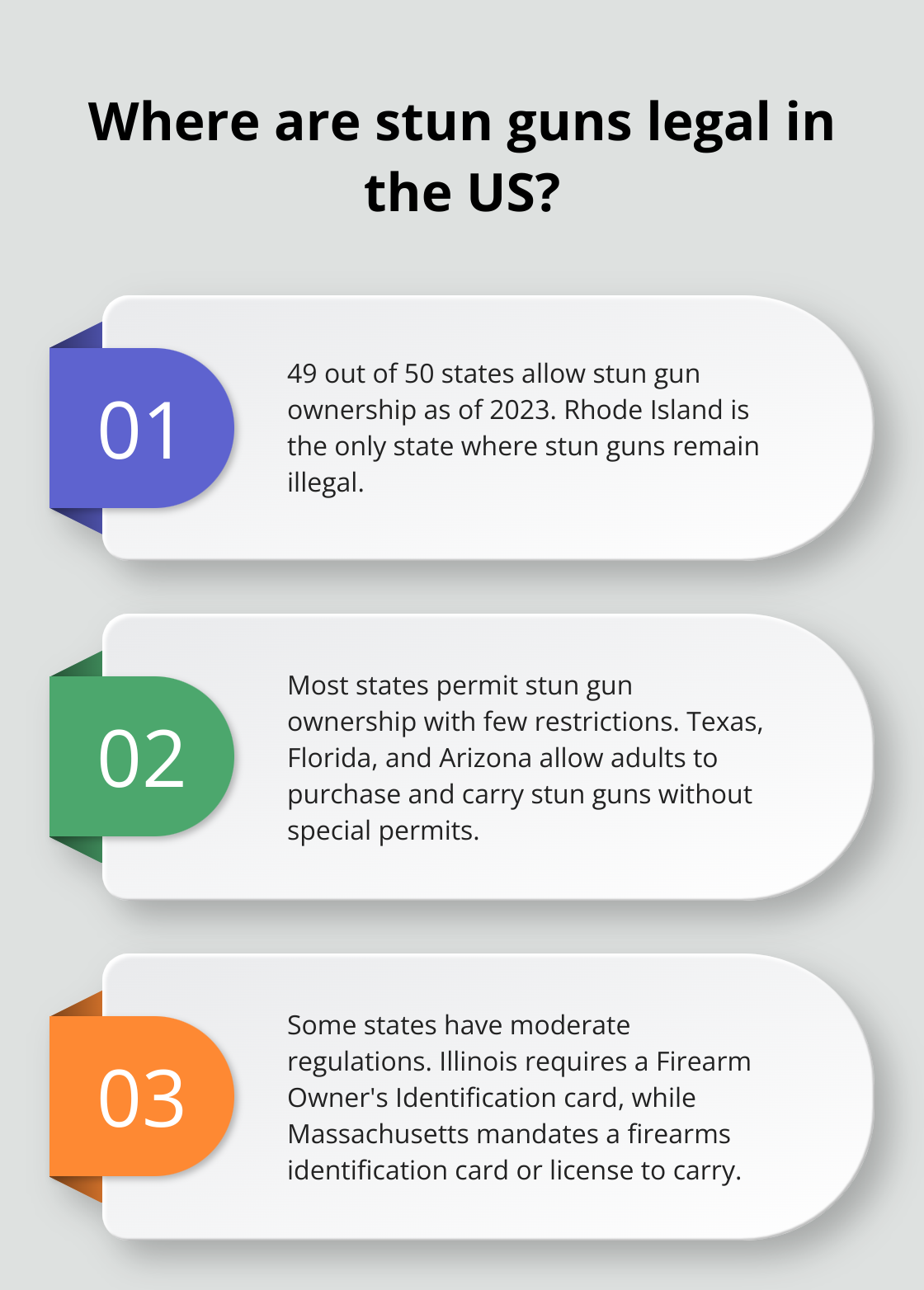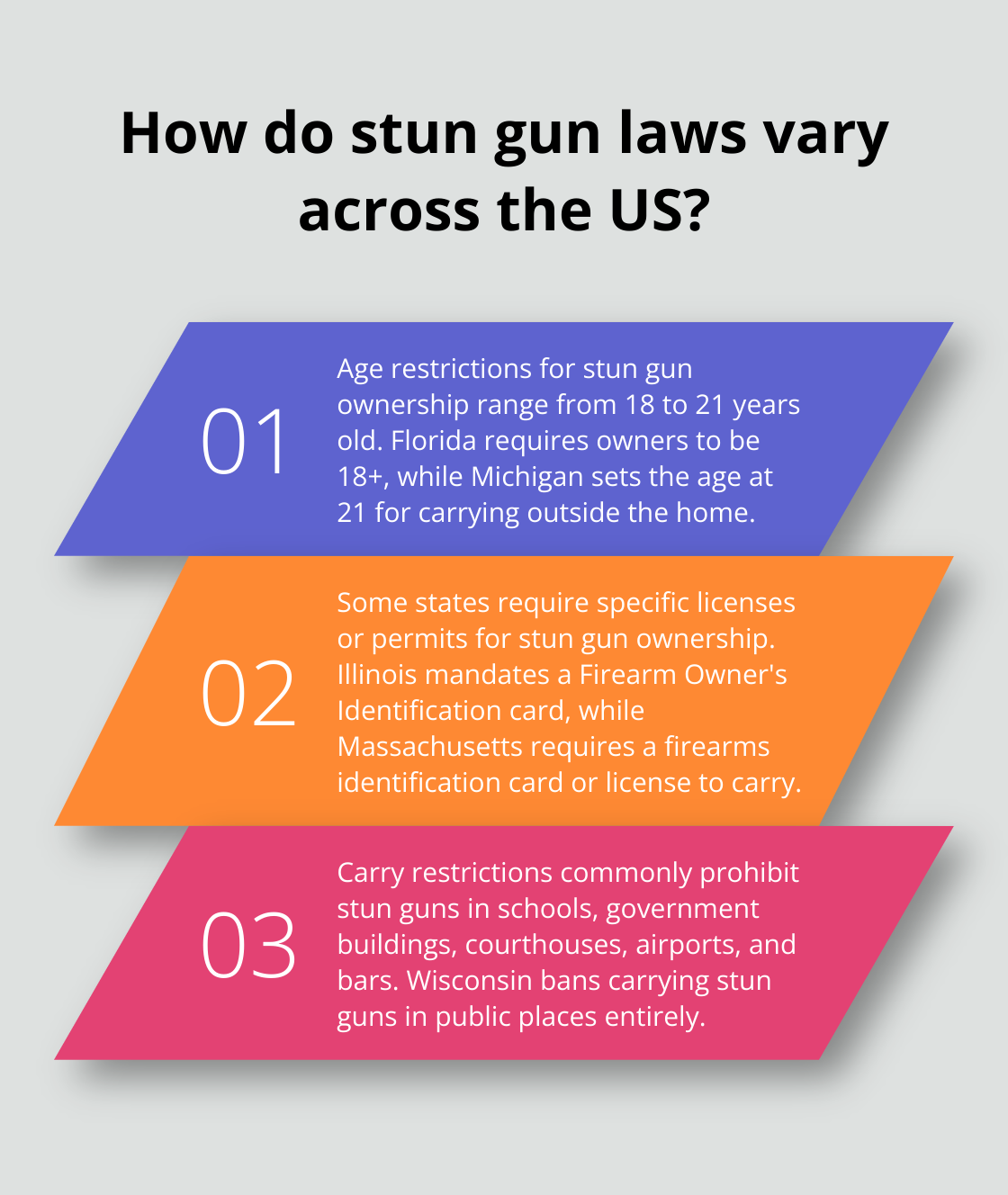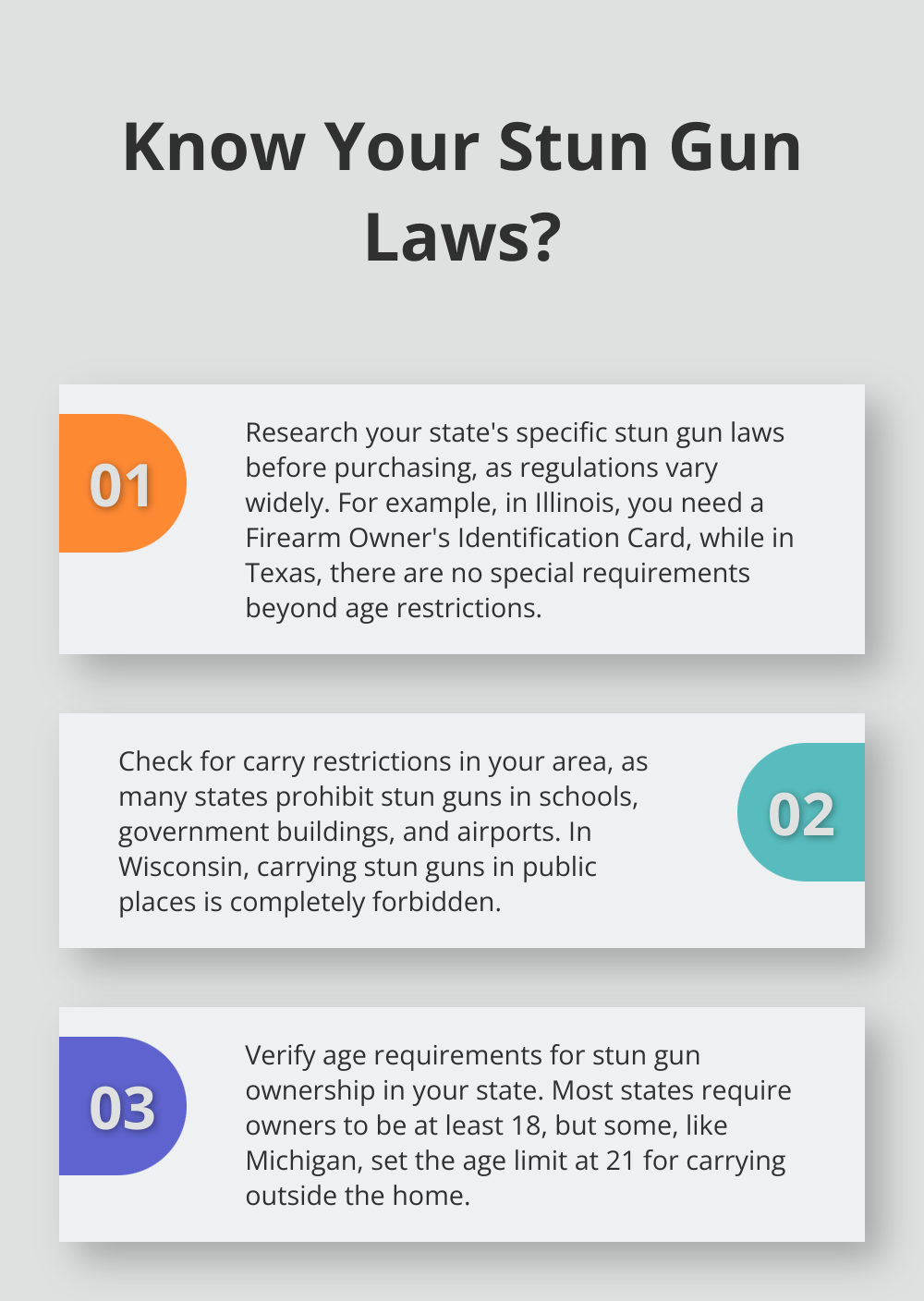Elite Warrior Defense
free shipping on orders over $25
We're having a 15% off sale on all our products. Enter your email below to be notified about future sales.

Stun guns are powerful self-defense tools, but their legality varies across the United States. At Elite Warrior Defense LLC, we understand the importance of knowing your state’s specific regulations.
This guide breaks down stun gun laws state by state, helping you navigate the complex legal landscape. We’ll explore factors affecting legality, including age restrictions, licensing requirements, and potential penalties for misuse.
Stun guns are handheld electronic devices designed for self-defense. They deliver a high-voltage, low-amperage shock to an attacker, causing temporary neuromuscular incapacitation. This non-lethal weapon provides users with valuable seconds to escape dangerous situations.
At the federal level, stun guns face minimal regulation. The U.S. government does not classify them as firearms or destructive devices. This lack of federal oversight means there’s no nationwide ban or restriction on their ownership. However, this doesn’t guarantee stun guns are legal everywhere.
State laws governing stun guns vary significantly. As of 2023, 48 states permit some form of stun gun ownership, with Rhode Island being one of two states that has a complete ban on the possession of stun guns and Tasers. However, the specifics of these laws differ greatly from state to state.

Many states impose restrictions on:
For instance, Illinois requires a Firearm Owner’s Identification Card for stun gun purchase, with some exceptions. In contrast, states like Texas and Florida have no special requirements beyond age restrictions. Some cities (such as Chicago and Philadelphia) have their own ordinances that further restrict or ban stun guns.
Knowledge of your state’s specific stun gun laws is essential. Violating these laws, even unintentionally, can result in serious legal consequences. Penalties range from fines to jail time, depending on the jurisdiction and the nature of the violation.
Moreover, understanding the law helps you make informed decisions about your self-defense options. If stun guns face heavy restrictions in your area, you might consider alternatives like pepper spray or personal alarms (which Elite Warrior Defense LLC also offers).
We recommend thorough research of your local laws before purchasing any self-defense product. While customer service teams can provide general guidance, specific legal advice should come from a local attorney familiar with your state’s self-defense laws.
As we move forward, we’ll examine the state-by-state breakdown of stun gun laws, highlighting the variations and key factors that affect their legality across the United States. For example, in Massachusetts, stun guns are legal, but owners need a carry permit and must keep the device secured in a locked container.
As of 2023, most states permit stun gun ownership with few restrictions. Texas, Florida, and Arizona exemplify states where adults can purchase and carry stun guns without special permits. However, age restrictions apply, with most states requiring owners to be at least 18 years old.

In these states, you can generally carry a stun gun for self-defense without additional licensing. However, limitations exist on where you can carry your device. Many states prohibit stun guns in schools, government buildings, or airports.
Some states have implemented more stringent regulations on stun gun ownership and use. For example:
As of 2023, Rhode Island remains the only state where taser purchase, possession, and use are illegal. Hawaii previously banned stun guns but legalized them in 2022, subject to certain restrictions.
It’s important to note that even in states where stun guns are legal, individual cities or counties may have stricter regulations. Some cities in California, for instance, have local ordinances that prohibit or severely restrict stun gun possession, despite their legality at the state level.
Given the variability in laws and the potential for recent changes, it’s essential to verify current regulations with local law enforcement or legal counsel before purchasing or carrying a stun gun. While customer service teams can provide general guidance, specific legal advice should come from a local attorney familiar with your state’s self-defense laws.
Responsible ownership and use of stun guns is paramount. Always prioritize safety and comply with all applicable laws and regulations when considering stun guns (or any other self-defense tools) for your personal protection needs.
As we move forward, let’s examine the factors that influence stun gun legality across different states, including age restrictions, licensing requirements, and potential penalties for misuse.
Most states that allow stun guns require owners to be at least 18 years old. Florida, for example, mandates individuals to be 18 or older to purchase and possess a stun gun. Some states set higher age limits. Michigan requires individuals to be 21 to obtain a concealed pistol license, which is necessary for carrying a stun gun outside one’s home or business.
While many states don’t require specific licenses for stun gun ownership, some have implemented stricter regulations. Illinois mandates a Firearm Owner’s Identification (FOID) card for stun gun purchase and possession. This process involves a background check and can take several weeks to complete. Massachusetts requires a firearms identification card or license to carry, which includes a background check and completion of a firearms safety course.
Even in states where stun guns are legal, restrictions often exist on where you can carry them. Common prohibited areas include:

Some states, like Wisconsin, prohibit carrying stun guns in public places altogether. You should always check your local laws before carrying a stun gun outside your home.
The consequences of illegal stun gun possession or misuse can be severe. In New Jersey, unlawful possession of a stun gun is a fourth-degree crime, punishable by up to 18 months in prison and a fine of up to $10,000. In California, using a stun gun for any purpose other than self-defense is a misdemeanor, which can result in up to one year in county jail and a fine of up to $1,000.
Penalties can escalate if the stun gun is used in the commission of a crime. In such cases, the charge could be elevated to a felony, resulting in significant prison time and hefty fines.
The complexity and variability of stun gun laws make thorough research of local regulations essential before purchasing any self-defense product. While customer service teams can provide general guidance, specific legal advice should come from a local attorney familiar with your state’s self-defense laws.
Responsible ownership and use of stun guns is paramount. You should always prioritize safety and comply with all applicable laws and regulations when considering stun guns (or any other self-defense tools) for your personal protection needs.
Understanding stun gun laws in your state is essential for responsible self-defense. The regulations surrounding stun guns vary significantly across the United States, with each state implementing its own set of rules and restrictions. This complex legal landscape highlights the importance of staying informed about your local laws.

Stun guns are powerful self-defense tools that demand responsible use. They should only be employed in genuine self-defense situations, and always in accordance with local laws. Misuse can lead to serious legal consequences, including fines and imprisonment.
Elite Warrior Defense offers a range of products to enhance personal safety. We provide effective tools to help you feel secure in various situations. Your security is paramount, and being well-informed is key to achieving it.